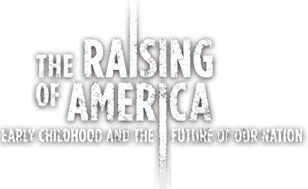Resources for Early Childhood Development
Below is a collection of resources available for you to download or add to Your Favorites. Search the collection using keywords and tags.
Make selections above to narrow results.
The Raising of America
EPISODE 1: THE SIGNATURE HOUR. The science is clear: when parents are stressed, babies pay the price. That is why improving conditions for families with young children is one of the best investments any nation can make.
Add to Your Favorites
Remove from Your Favorites
Wounded Places
What happens to children and neighborhoods shaken by trauma and toxic stress? What does it take to heal?
Add to Your Favorites
Remove from Your Favorites
Drip, Drip, Drip: Stress Gets Under Their Skin
That parents are increasingly stressed is no surprise. But how might that stress drip down on their babies?
Add to Your Favorites
Remove from Your Favorites
What’s the Amygdala-PFC Connection?
The Wisconsin team found weaker connections in the neural circuits connecting the amygdala with the prefrontal cortex in teenage girls whose parents reported higher stress when the girls were infants. It was as if the threat signals from the amygdala weren’t getting through and couldn’t be assessed properly by the prefrontal cortex.
Add to Your Favorites
Remove from Your Favorites
Stress: The Good, the Bad and the Toxic
Not all stress is the same. There's good stress (for developing), bad stress (from which we can recover), and toxic stress (which is the worst in the long run).
Add to Your Favorites
Remove from Your Favorites
Snap, Snap Synapse
Brains are built. Our early relationships and environments, our history, literally get under the skin and shape the architecture of our developing brain.
Add to Your Favorites
Remove from Your Favorites
Building a Nest in the Middle of a Desert
In a pioneering experiment, McGill University’s Michael Meaney showed that newborn rat pups which were licked and groomed by their mothers after birth grew up to be relatively calm and inquisitive. But pups of low-licking and grooming mothers grew up to be on a flight-or-flight stress trigger. Does this apply to humans as well?
Add to Your Favorites
Remove from Your Favorites
Is This a Safe World?
Dr. Renee Boynton-Jarrett describes what a child feels: Is this a safe world? What will happen when I feel afraid? What will happen when I feel hungry?
Add to Your Favorites
Remove from Your Favorites
The Stressors Can Be Relentless on the Brain
Many children in our society feel like a truck is coming at them all day long, for more days than not, and this really takes a toll.
Add to Your Favorites
Remove from Your Favorites
DNA Is Not Destiny
How do our social environments (nurturing, toxic, and in-between) alter the epigenetic ‘dimmer switches’ that turn our genes on and off—with enduring consequences?
Add to Your Favorites
Remove from Your Favorites
700 New Synapses Every Single Second
More than 80 billion brain cells. That’s how many a baby is born with. But it’s the connections between cells that matter.
Add to Your Favorites
Remove from Your Favorites
Would Early Life Stress Stay in Their Bodies?
How might child developmental paths be affected by the stressors parents face when their kids are babies? In Wisconsin, researchers followed 500 children for two decades to find out.
Add to Your Favorites
Remove from Your Favorites
Reversing the Epigenetic Effects
Humans are resilient organisms and studies show that negative epigenetic effects need not be permanent.
Add to Your Favorites
Remove from Your Favorites
Can Poverty Modify the Epigenome?
If social conditions can “get under the skin” and modify our biology, are less-affluent children being primed for more problems in life?
Add to Your Favorites
Remove from Your Favorites
Building a Nest in the Middle of a Desert
Rat mothers like to build nests for their pups with soft materials. But these moms have only been given hard, scratchy, inferior building supplies.
Add to Your Favorites
Remove from Your Favorites
Our Experiences Go Deeper Than We Thought
We’ve long known that early life can last a lifetime. Now new science shows how our experiences can become imprinted in our biology, altering gene expression.
Add to Your Favorites
Remove from Your Favorites
Can We See Toxic Stress in the Brain?
Which neuron is damaged by toxic stress? For neuroscientists, the answer is clear.
Add to Your Favorites
Remove from Your Favorites
The Amygdala-Prefrontal Cortex Connection is Crucial
Scientists detected changes in the brain architecture of 18 year-olds whose parents had reported being under chronic stress when those same adolescents were babies.
Add to Your Favorites
Remove from Your Favorites
Trailer - The Raising of America (11 min)
The Raising of America reframes the way we look at early child health and development. This ambitious documentary series and multimedia initiative by the producers of UNNATURAL CAUSES: Is Inequality Making Us Sick? explores how a strong start for all our kids leads not only to better individual life course outcomes (learning, earning and physical and mental health) but also to a healthier, safer, better educated and more prosperous and equitable America.
Add to Your Favorites
Remove from Your Favorites





















